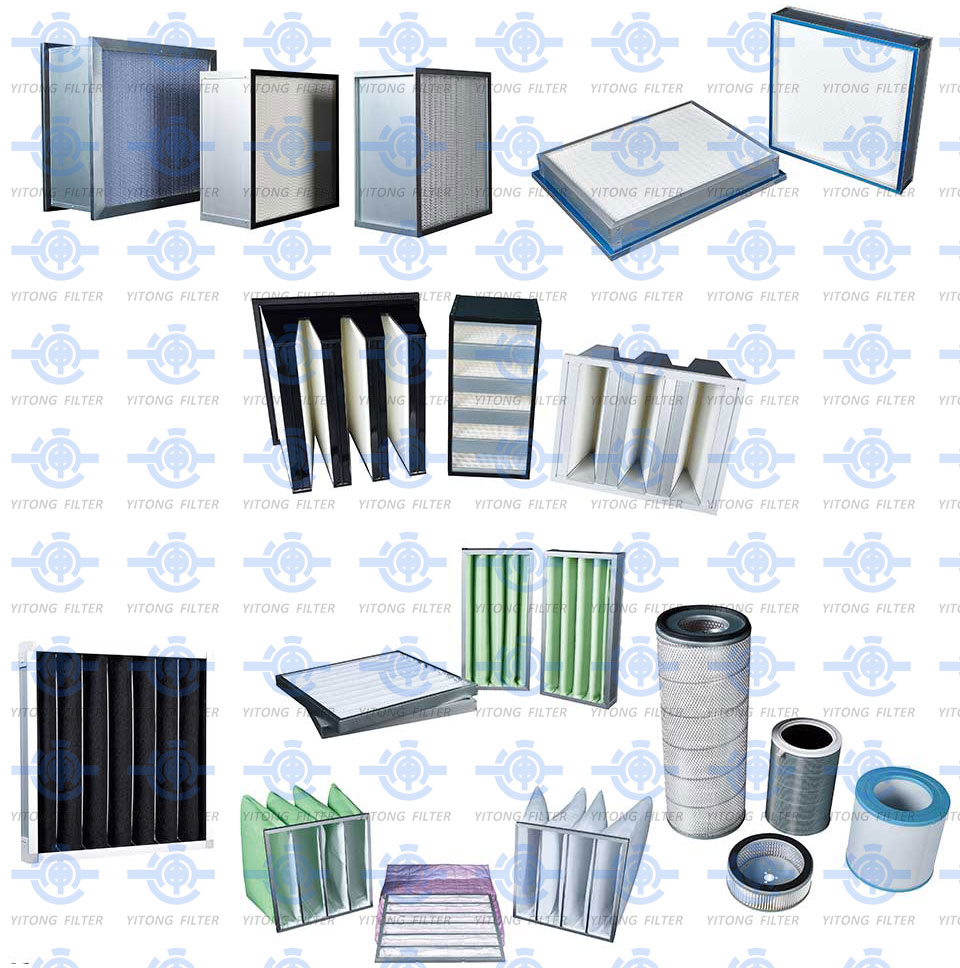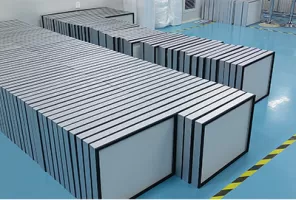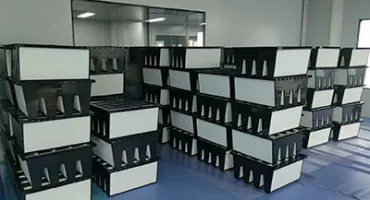 January 21, 2025
January 21, 2025
In industries like pharmaceuticals, electronics, healthcare, and biotechnology, maintaining a controlled environment is critical. Cleanrooms are designed to ensure minimal contamination, and a key component of their air filtration system is the Fan Filter Unit (FFU). FFU filters play a vital role in delivering clean air, protecting products, and ensuring compliance with strict industry standards.
This blog explores FFU filters, their importance, types, and applications, and provides insights into selecting and maintaining them effectively.

Fan Filter Units (FFUs) are self-contained devices that combine a fan, motor, and filter to supply clean air directly to a specific area. FFUs are commonly used in cleanrooms and other controlled environments to maintain the desired air quality by continuously filtering and recirculating air.
FFU filters are the critical components within these units, responsible for removing airborne contaminants. These filters typically include HEPA (High-Efficiency Particulate Air) or ULPA (Ultra-Low Penetration Air) media to ensure high levels of filtration efficiency.
FFU filters are crucial for several reasons:
1. Maintaining Cleanroom Standards
- Cleanrooms are classified based on the maximum allowable particle count in the air. FFU filters ensure compliance with standards like ISO 14644 or FED-STD-209E by removing microscopic particles.
2. Protecting Sensitive Products
- In industries like semiconductor manufacturing or pharmaceutical production, even the tiniest contaminants can ruin products or compromise safety. FFU filters protect against this risk.
3. Ensuring Personnel Safety
- FFUs with high-quality filters help maintain air quality for workers in environments with potentially harmful particulates.
4. Energy Efficiency
- Modern FFUs are designed for low energy consumption, making them cost-effective while ensuring consistent airflow and filtration.
FFU filters operate as part of a larger system to purify air and maintain desired airflow patterns:
1. Air Intake
- Air is drawn into the FFU from the surrounding environment, often through a pre-filter that captures larger particles.
2. Filtration
- The primary filter (HEPA or ULPA) removes up to 99.99% of particles as small as 0.3 microns (HEPA) or 0.12 microns (ULPA).
3. Air Distribution
- The filtered air is discharged evenly across the cleanroom or work area, ensuring proper airflow and particle containment.
FFU filters are available in various configurations to suit different environments and requirements:
1. HEPA Filters
- Efficiency: Capture 99.97% of particles 0.3 microns or larger.
- Applications: Suitable for most cleanroom environments, including pharmaceuticals and electronics.
- Advantages: High filtration efficiency at a reasonable cost.
2. ULPA Filters
- Efficiency: Capture 99.999% of particles 0.12 microns or larger.
- Applications: Ideal for environments requiring the highest level of cleanliness, such as semiconductor manufacturing or medical research.
- Advantages: Ultra-fine filtration for critical applications.
3. Pre-Filters
- Function: Capture larger particles to extend the lifespan of HEPA or ULPA filters.
- Applications: Used as a first layer of defense in high-dust environments.
- Advantages: Cost-effective way to reduce maintenance frequency.
- Function: Remove odors, gases, and volatile organic compounds (VOCs).
- Applications: Cleanrooms dealing with chemicals or odors, such as labs or pharmaceutical plants.
- Advantages: Provides chemical filtration in addition to particulate removal.
FFU filters are indispensable in a wide range of industries, including:
1. Semiconductor Manufacturing
- Tiny particles can disrupt the intricate processes involved in creating microchips and circuits. FFU filters maintain an ultra-clean environment to prevent defects.
2. Pharmaceuticals
- Ensuring sterile production conditions is critical to comply with Good Manufacturing Practices (GMP). FFU filters help maintain contamination-free environments.
3. Healthcare
- In hospitals and laboratories, FFU filters are used in isolation rooms, surgical suites, and biosafety cabinets to protect patients and staff.
4. Food and Beverage
- In facilities requiring high hygiene standards, FFU filters ensure clean air during food packaging and processing.
5. Aerospace
- Aircraft component manufacturing demands ultra-clean environments, achieved using advanced FFU filtration systems.
Using FFU filters offers several advantages:
1. High Filtration Efficiency
- Effectively removes fine particulates, ensuring compliance with cleanroom standards.
2. Scalability
- FFUs can be added to meet the changing demands of a facility, making them a flexible solution.
3. Energy Efficiency
- Many FFUs are designed with energy-efficient fans and motors, reducing operational costs.
4. Low Noise Levels
- Modern FFUs operate quietly, maintaining a comfortable work environment.
5. Longevity
- When maintained properly, FFU filters can provide long-term, reliable service.
Selecting the appropriate FFU filter depends on several factors:
1. Cleanroom Classification
- Determine the required ISO class for your cleanroom to select a filter with the appropriate efficiency.
2. Airflow Requirements
- Match the filter to the desired airflow rate (measured in cubic feet per minute or CFM).
3. Type of Contaminants
- Consider whether the environment has particulates, gases, or VOCs that require removal.
4. Durability
- Filters should withstand the environmental conditions, including temperature, humidity, and chemical exposure.
5. Energy Consumption
- Choose filters that balance efficiency with low energy usage for cost-effective operation.
To ensure optimal performance and extend the lifespan of FFU filters, follow these maintenance practices:
1. Regular Inspections
- Check filters for signs of clogging, wear, or damage.
2. Monitor Pressure Drop
- An increase in pressure drop across the filter indicates it may be time for replacement.
3. Replace Pre-Filters Frequently
- Pre-filters protect the main filter and should be replaced regularly to maximize efficiency.
4. Keep the Cleanroom Clean
- Reduce airborne particulates by maintaining clean surroundings and minimizing personnel movement.
5. Follow Manufacturer Guidelines
- Adhere to the recommended replacement schedule and use compatible filter media.
Advancements in FFU filter technology are shaping the future of cleanroom air filtration:
1. IoT-Enabled FFUs
- Smart filters with sensors monitor performance in real-time, providing data for predictive maintenance.
2. Sustainable Materials
- Development of eco-friendly filter media to reduce environmental impact.
3. Enhanced Energy Efficiency
- Improved designs minimize power consumption without compromising filtration quality.
4. Custom Solutions
- Tailored FFU systems for specialized industries and unique requirements.
FFU filters are the backbone of cleanroom air filtration, ensuring contaminant-free environments for industries that demand precision and cleanliness. Whether you’re manufacturing semiconductors, producing pharmaceuticals, or conducting cutting-edge research, investing in high-quality FFU filters is essential.
By selecting the right filters, maintaining them properly, and staying informed about emerging trends, you can achieve optimal cleanroom performance, protect sensitive processes, and comply with industry standards.
With their efficiency, adaptability, and reliability, FFU filters are indispensable tools for modern cleanroom management, ensuring that both products and personnel remain safe and productive.
 Sep. 05, 2025
H14 Filter: Essential High-Efficiency Filtration for Critical Industries
Sep. 05, 2025
H14 Filter: Essential High-Efficiency Filtration for Critical Industries
 Jul. 24, 2025
G4 Air Filter: A Complete Guide for Effective Air Filtration
Jul. 24, 2025
G4 Air Filter: A Complete Guide for Effective Air Filtration
 Sep. 12, 2023
F9 V-Bank Air Filter Ordered by Russian Custome
Sep. 12, 2023
F9 V-Bank Air Filter Ordered by Russian Custome
The F9 V-Bank Air Filters ordered by the Russian customer have been shipped.

